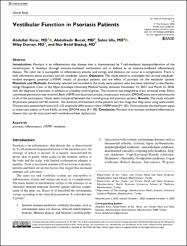| dc.contributor.author | Kınar, Abdullah | |
| dc.contributor.author | Bucak, Abdulkadir | |
| dc.contributor.author | Ulu, Şahin | |
| dc.contributor.author | Duman, Nilay | |
| dc.contributor.author | Baştuğ, Nur Betül | |
| dc.date.accessioned | 2021-05-05T22:11:51Z | |
| dc.date.available | 2021-05-05T22:11:51Z | |
| dc.date.issued | 2020 | |
| dc.identifier.issn | 0145-5613 | |
| dc.identifier.uri | https://doi.org/10.1177/0145561320970683 | |
| dc.identifier.uri | https://hdl.handle.net/20.500.12933/191 | |
| dc.description | 2-s2.0-85096371460 | en_US |
| dc.description.abstract | Introduction: Psoriasis is an inflammatory skin disease that is characterized by T-cell-mediated hyperproliferation of the keratinocytes. It develops through immune-mediated mechanisms and is defined as an immune-mediated inflammatory disease. The inner ear is susceptible to inflammatory attacks, and vertigo and dizziness can occur as a complication. There is little information about psoriasis and the vestibular system. Objective: This study aimed to investigate the cervical vestibular-evoked myogenic potential (cVEMP) results of psoriasis patients and the effect of psoriasis on the vestibular system. Materials and Methods: Randomly selected and included in the study were patients who had been admitted to the Dermatology Outpatient Clinic of the Afyon Kocatepe University Medical Faculty, between November 15, 2017, and March 15, 2018, with the diagnosis of psoriasis, in addition to a healthy control group. This research was designed as cross-sectional study. Ethics committee permission was received. Both cVEMP and distortion product otoacoustic emission (DPOAE) tests were administered to all of the participants. Values were compared between the control group and psoriasis patients. Results: The study included 43 psoriasis patients and 40 controls. The duration of treatment of the patients and the drugs that they were using were noted. The psoriasis patients had lower p13–n23 amplitude differences in their cVEMP tests (P <.05). These patients also had lower signal to noise ratio values, at 4 and 6 kHz, on their DPOAE tests (P <.05). Conclusion: Psoriasis is an immune-mediated inflammatory disease that can be associated with vestibulocochlear dysfunction. © The Author(s) 2020. | en_US |
| dc.language.iso | en | |
| dc.publisher | SAGE Publications Ltd | en_US |
| dc.relation.ispartof | Ear, Nose and Throat Journal | |
| dc.rights | info:eu-repo/semantics/openAccess | en_US |
| dc.subject | cVEMP | en_US |
| dc.subject | inflammation | en_US |
| dc.subject | psoriasis | en_US |
| dc.subject | vestibular | en_US |
| dc.title | Vestibular Function in Psoriasis Patients | en_US |
| dc.type | Article | |
| dc.department | AFSÜ, Tıp Fakültesi, Cerrahi Tıp Bilimleri Bölümü, Kulak Burun ve Boğaz Hastalıkları Ana Bilim Dalı | |
| dc.institutionauthor | Bucak, Abdulkadir | |
| dc.institutionauthor | Ulu, Şahin | |
| dc.institutionauthor | Duman, Nilay | |
| dc.institutionauthor | Baştuğ, Nur Betül | |
| dc.identifier.doi | 10.1177/0145561320970683 | |
| dc.relation.publicationcategory | Makale - Uluslararası Hakemli Dergi - Kurum Öğretim Elemanı | en_US |
| dc.identifier.pmid | 33213202 | |
| dc.identifier.scopus | 2-s2.0-85096371460 | |
| dc.identifier.scopusquality | Q2 | |
| dc.identifier.wos | WOS:000680378200001 | |
| dc.identifier.wosquality | Q3 | |
| dc.indekslendigikaynak | Web of Science | |
| dc.indekslendigikaynak | Scopus | |
| dc.indekslendigikaynak | PubMed | |
















